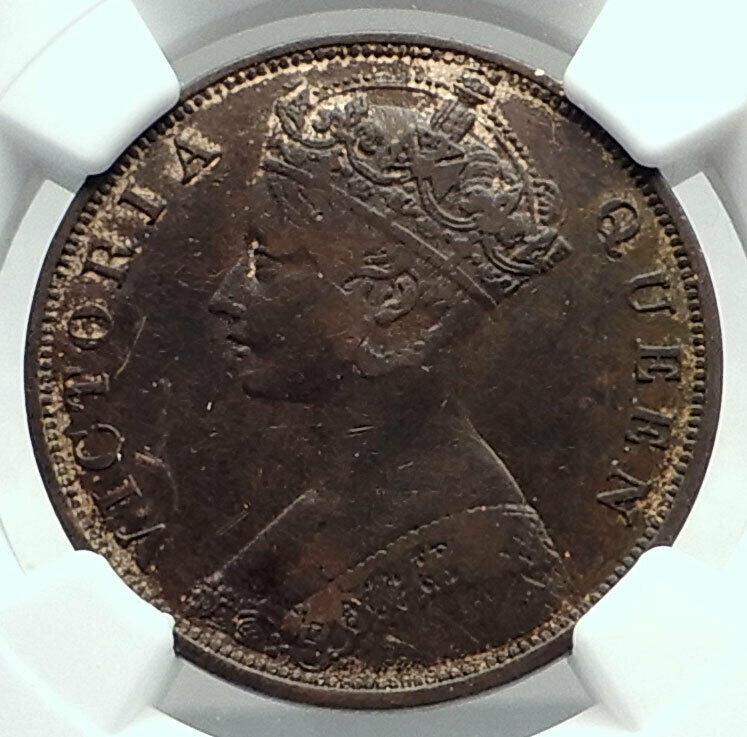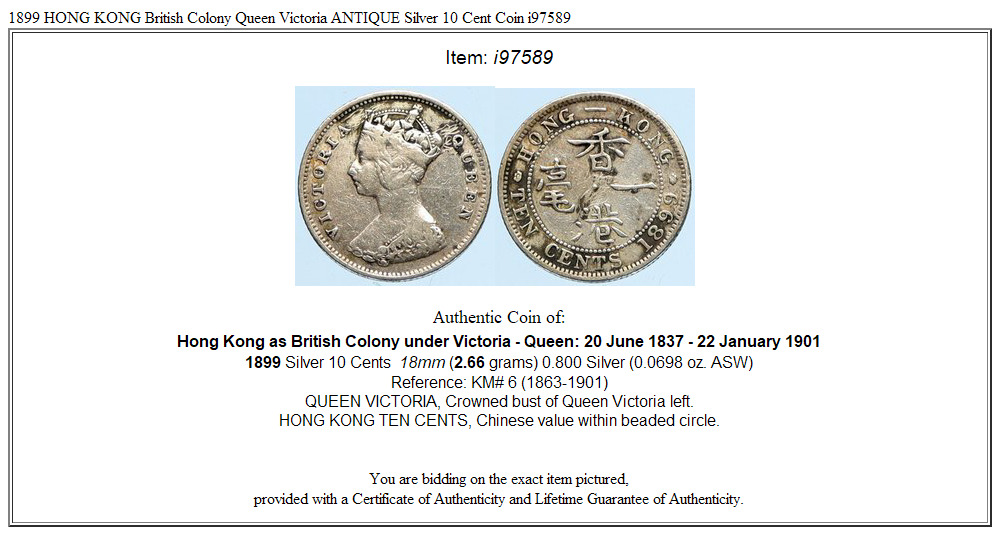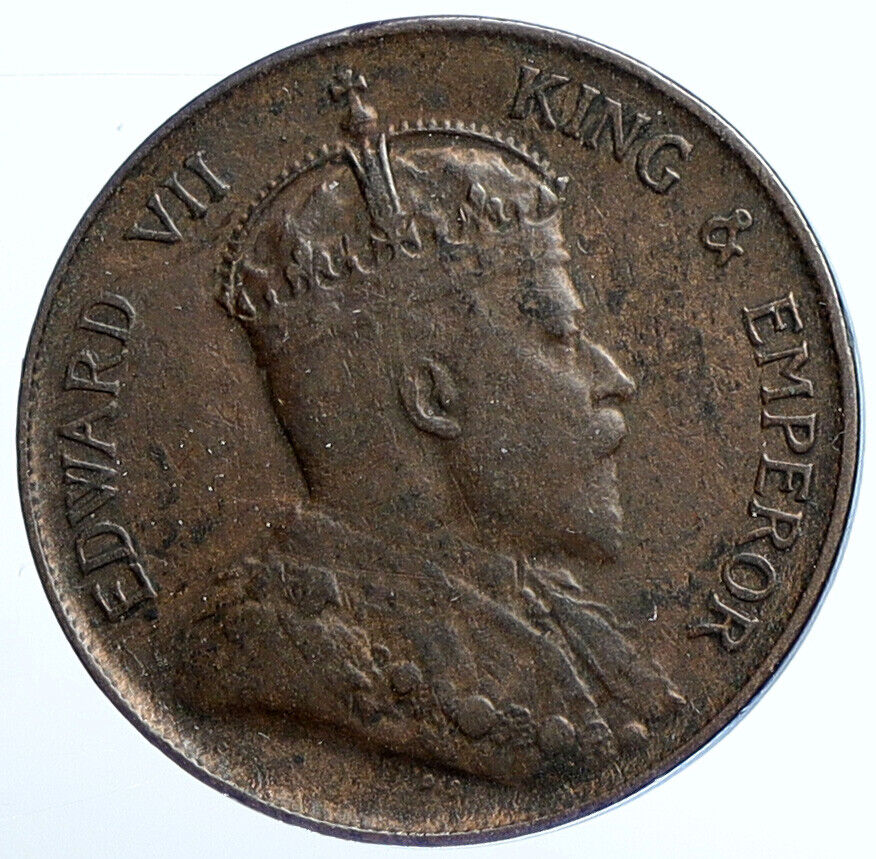|
Hong Kong as British Colony under Victoria – Queen: 20 June 1837 – 22 January 1901
1898 Silver 10 Cents 18mm (2.61 grams) 0.800 Silver (0.0698 oz. ASW)
Reference: KM# 6.3
QUEEN VICTORIA, Crowned bust of Queen Victoria left.
HONG KONG TEN CENTS, Chinese value within beaded circle.
You are bidding on the exact item pictured, provided with a Certificate of Authenticity and Lifetime Guarantee of Authenticity.
 Victoria (Alexandrina Victoria; 24 May 1819 – 22 January 1901) was Queen of the United Kingdom of Great Britain and Ireland from 20 June 1837 until her death. From 1 May 1876, she had the additional title of Empress of India. Victoria (Alexandrina Victoria; 24 May 1819 – 22 January 1901) was Queen of the United Kingdom of Great Britain and Ireland from 20 June 1837 until her death. From 1 May 1876, she had the additional title of Empress of India.
Victoria was the daughter of Prince Edward, Duke of Kent and Strathearn, the fourth son of King George III. Both the Duke of Kent and King George III died in 1820, and Victoria was raised under close supervision by her German-born mother Princess Victoria of Saxe-Coburg-Saalfeld. She inherited the throne aged 18, after her father’s three elder brothers had all died, leaving no surviving legitimate children. The United Kingdom was already an established constitutional monarchy, in which the sovereign held relatively little direct political power. Privately, Victoria attempted to influence government policy and ministerial appointments; publicly, she became a national icon who was identified with strict standards of personal morality.
Victoria married her first cousin, Prince Albert of Saxe-Coburg and Gotha, in 1840. Their nine children married into royal and noble families across the continent, tying them together and earning her the sobriquet “the grandmother of Europe”. After Albert’s death in 1861, Victoria plunged into deep mourning and avoided public appearances. As a result of her seclusion, republicanism temporarily gained strength, but in the latter half of her reign her popularity recovered. Her Golden and Diamond Jubilees were times of public celebration.
Her reign of 63 years and seven months is known as the Victorian era. It was a period of industrial, cultural, political, scientific, and military change within the United Kingdom, and was marked by a great expansion of the British Empire. She was the last British monarch of the House of Hanover. Her son and successor, Edward VII, belonged to the House of Saxe-Coburg and Gotha, the line of his father.
  Hong Kong (literally: “Fragrant Harbour”), officially Hong Kong Special Administrative Region of the People’s Republic of China, is an autonomous territory on the southern coast of China at the Pearl River Estuary and the South China Sea. Hong Kong is known for its skyline and deep natural harbour. It has a land area of 1104 km2 and shares its northern border with Guangdong Province of Mainland China. With around 7.2 million inhabitants of various nationalities, Hong Kong is one of the world’s most densely populated metropolises. Hong Kong (literally: “Fragrant Harbour”), officially Hong Kong Special Administrative Region of the People’s Republic of China, is an autonomous territory on the southern coast of China at the Pearl River Estuary and the South China Sea. Hong Kong is known for its skyline and deep natural harbour. It has a land area of 1104 km2 and shares its northern border with Guangdong Province of Mainland China. With around 7.2 million inhabitants of various nationalities, Hong Kong is one of the world’s most densely populated metropolises.
After the First Opium War (1839-42), Hong Kong became a British colony with the perpetual cession of Hong Kong Island, followed by Kowloon Peninsula in 1860 and a 99-year lease of the New Territories from 1898. Hong Kong remained under continuous British control for about a century until the Second World War, when Japan occupied the colony from December 1941 to August 1945. British control resumed in 1945 following the Surrender of Japan. In the 1980s, negotiations between the United Kingdom and China resulted in the 1984 Sino-British Joint Declaration, which provided for the transfer of sovereignty of Hong Kong on 30 June 1997. The territory became a special administrative region of China with a high degree of autonomy on 1 July 1997 under the principle of one country, two systems. Disputes over the perceived misapplication of this principle have contributed to popular protests, including the 2014 Umbrella Revolution.
In the late 1970s, Hong Kong became a major entrepôt in Asia-Pacific. The territory has developed into a major global trade hub and financial centre. The 44th-largest economy in the world, Hong Kong ranks top 10 in GDP (PPP) per capita, but also has the most severe income inequality among advanced economies. Hong Kong is one of the three most important financial centres alongside New York and London, and the world’s number one tourist destination city. The territory has been named the freest market economy. The service economy, characterised by free trade and low taxation, has been regarded as one of the world’s most laissez-faire economic policies, and the currency, the Hong Kong dollar, is the 13th most traded currency in the world.
The Hong Kong Basic Law is its quasi-constitution which empowers the region to develop relations and make agreements directly with foreign states and regions, as well as international organizations, in a broad range of appropriate fields. It is an independent member of APEC, the IMF, WTO, FIFA and International Olympic Committee among others.
Limited land created a dense infrastructure and the territory became a centre of modern architecture, and has a larger number of highrises than any other city in the world. Hong Kong has a highly developed public transportation network covering 90 per cent of the population, the highest in the world, and relies on mass transit by road or rail. Air pollution remains a serious problem. Loose emissions standards have resulted in a high level of atmospheric particulates. Nevertheless, residents of Hong Kong (sometimes referred to as Hongkongers) enjoy one of the longest life expectancies in the world.
|







 Victoria (Alexandrina Victoria; 24 May 1819 – 22 January 1901) was Queen of the United Kingdom of Great Britain and Ireland from 20 June 1837 until her death. From 1 May 1876, she had the additional title of Empress of India.
Victoria (Alexandrina Victoria; 24 May 1819 – 22 January 1901) was Queen of the United Kingdom of Great Britain and Ireland from 20 June 1837 until her death. From 1 May 1876, she had the additional title of Empress of India.
 Hong Kong (literally: “Fragrant Harbour”), officially Hong Kong Special Administrative Region of the People’s Republic of China, is an autonomous territory on the southern coast of China at the Pearl River Estuary and the South China Sea. Hong Kong is known for its skyline and deep natural harbour. It has a land area of 1104 km2 and shares its northern border with Guangdong Province of Mainland China. With around 7.2 million inhabitants of various nationalities, Hong Kong is one of the world’s most densely populated metropolises.
Hong Kong (literally: “Fragrant Harbour”), officially Hong Kong Special Administrative Region of the People’s Republic of China, is an autonomous territory on the southern coast of China at the Pearl River Estuary and the South China Sea. Hong Kong is known for its skyline and deep natural harbour. It has a land area of 1104 km2 and shares its northern border with Guangdong Province of Mainland China. With around 7.2 million inhabitants of various nationalities, Hong Kong is one of the world’s most densely populated metropolises.




